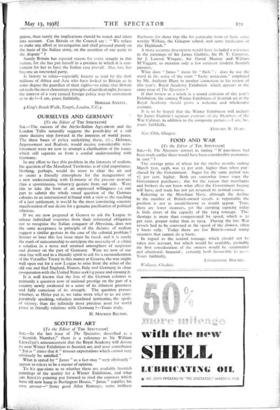OURSELVES AND GERMANY [To the Editor of THE SPECTATOR] Sta,—The
success of the Anglo-Italian Agrcement and the London Talks naturally suggests the possibility of a still more decisive step forward in the interests of world peace. The three bases of policy underlying these, viz., Defence, Appeasement and Realism, would receive considerable rein- forcement were we now to attempt a clarification of the issues which still separate us from a cordial understanding with Germany.
In any effort to face this problem in the interests of realism, the question of the Mandated Territories is of vital importance. Nothing, perhaps, would do more to clear the air and to create a friendly atmosphere for the inauguration of a new understanding with Germany at the present mow ent than a spontaneous, voluntary gesture from our side. Were this to take the form of an expressed willingness cn our part to submit the whole vexed question of the German colonies to an international tribunal with a view to the reaching of a just settlement, it would be the most convincing concrete manifestation of our desire for a genuine pacification of political relations.
If we are now prepared at Geneva to ask the League to release individual countries from their inferential obligation not to recognise the Italian conquest of Abyssinia, does not the same acceptance in principle of the dictates of realism suggest a similar gesture in the case of the colonial problem ? Sooner or later this last issue must be faced, and it is surely the mark of statesmanship to anticipate the necessity of :e aching a solution in a tense and strained atmosphere of suspicion and distrust on the part of Germany. Were we now of our own free will and in a friendly spirit to ask for a reconsideration of the Versailles Treaty in this matter at Geneva, the way might well open out for a new League to arise from the ashes of the old one and find England, France, Italy and Germany in close co-operation with the United States seekir g peace and ensuing it.
It is well known that the loss of the German colonies is primarily a question now of national prestige on the part of a country newly awakened to a sense of its inherent greatness and fully conscious of its strength. The question presses whether, as Hitler put it, we value more what to us are com- paratively speaking, valueless mandated territories, the spoils of victory, than the infinitely more precious asset for world peace in friendly relations with Germany ?—Yours truly,
H. MAURICE RELTON.














































 Previous page
Previous page